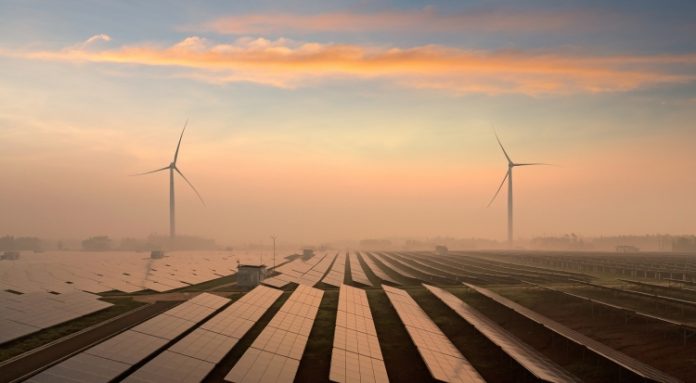Solar, wind and energy storage will do much of the heavy lifting in decarbonising the energy sector, with fossil fuel assets left stranded, however time is running out to realise that shift and limit global warming.
That is the conclusion of the United Nation’s Intergovernmental Panel on Climate Change’s (IPCC) latest report, which has stressed that it is “now or never” for the world to avert an unstoppable climate crisis.
The headline findings of the IPCC’s Working Group III report, published yesterday, are that while the world can halve emissions this decade and limit global warming to 1.5 degrees Celsius, time is very much of the essence. Immediate and deep reductions across all economic sectors globally are required.
“It’s now or never, if we want to limit global warming to 1.5°C… Without immediate and deep emissions reductions across all sectors, it will be impossible,” Jim Skea, co-chair of IPCC Working Group III, said.
“We have the tools and know-how required to limit warming,” IPCC chair Hoesung Lee said – the report in particular notes the sustained cost reductions witnessed in solar, wind and battery storage – and while Lee stressed that the world remains at a crossroads, climate action globally is cause for encouragement.
“There are policies, regulations and market instruments that are proving effective. If these are scaled up and applied more widely and equitably, they can support deep emissions reductions and stimulate innovation,” he said.
Setting the stage for emissions reduction
Chief among the 3,675-page report’s conclusions is the role of energy sector decarbonisation in halving emissions this decade, entailing a substantial reduction in the use of fossil fuels for power generation, a major upscaling of energy efficiency installations and widespread electrification of other sectors.
The report’s technical summary includes a chapter dedicated to the energy sector, detailing the IPCC’s modelling. It concludes that not only can broad decarbonisation of the energy sector reduce emissions this decade, but can “set the stage” for ongoing reductions beyond 2030. Opportunities to reduce emissions from electricity generation are “substantial”, the report states, but will require equally substantial changes to the way energy systems operate.
Within the IPCC’s models wherein further warming is likely limited to 2 degrees Celsius, low carbon sources of generation produce between 93 – 97% of global electricity by 2050, with solar PV and wind set to do much of the heavy lifting.
The report states that solar PV generation grew nearly three-fold to 680TWh over the 2015 – 2019 period, while wind and solar combined accounted for 8% of total electricity generation in 2019. These shares will unquestionably grow, and the IPCC’s report states its high confidence that incorporating high shares of variable generation will be mitigated through various energy storage technologies, transmission systems, demand side response technologies and other approaches that are already proven and demonstrable.
But for these opportunities to be realised, investment patterns will need to shift and new economic opportunities realised. Fossil fuel projects are certain to become stranded assets as the proliferation of cheaper renewables grows, while the report also concludes that a significant share of energy sector investments between now and 2050 will also be made in emerging economies – particularly across Asia – as those markets catch up with decarbonising their own power sectors.
The full technical summary can be read here.
Editor’s Comment
Liam Stoker, editor in chief, PV Tech
While it’s true that the top line of the IPCC’s report is cause for optimism – that there is still time for the world to avert the very worst of the climate crisis simply must be good news – the language used by the IPCC is stark. That it has come this far, and action is still inadequate, is a damning indictment of the world’s failure to grasp the severity of the situation sooner.
It will also be of real concern that the report’s call for an acceleration in solar, wind and energy storage coincides with unprecedented tightness in supply chains and, in some markets, policy environments that make sourcing PV modules all the more difficult.
The solar sector in particular has made it abundantly clear of late. It stands ready to deploy the vast quantities of clean energy required to decarbonise the energy sector, but it needs intervention in the right places. Planning and permitting must be streamlined, grids modernised in a more timely fashion and the PV manufacturing ecosystem upscaled and decentralised at pace. If those last remaining barriers fall, solar PV is ready to play its starring role.
Turning the marathon into a sprint
While much of the report’s conclusions will be of little surprise to those in the renewables sector – to a certain extent, it is very much preaching to the converted here – the industry has still responded with a sense of cautious optimism, welcoming its findings that while it may not be too late, an acceleration of deployment must happen this decade.
Keith Anderson, chief executive at UK utility and renewables developer ScottishPower, said it was now time to “turn this from a marathon into a sprint” and accelerate renewables deployment globally.
“Today’s IPPC report rightly calls for a rapid global phase-out of fossil fuels to address the climate crisis and here in the UK, we are showing that renewable energy is the way to a cleaner, better future for us all,” he added.
Richard Lum, co-CIO at asset investment group Victory Hill Capital Advisers, said the ongoing cost reductions of solar PV was cause for particular optimism, alongside the maturation of energy storage solutions and the potential for digital technologies to help decarbonise and decentralise energy networks.
“Humanity must continue to innovate but we must translate good ideas into immediate action if we are to succeed,” he said.
Renewables ready to ‘turn marathon into a sprint’ as IPCC report calls for acceleration
Low carbon sources account for up to 97% of all power generation by 2050 in the IPCC’s energy sector models.
Source:PVTECH
ViaLiam Stoker






